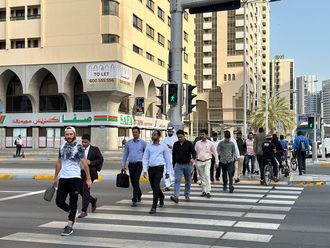Ali Muhsin Al Barwani bitterly reminisces the night of the revolution when police barracks were bombarded by Okello's rebels
On January 13, 1964, Ali Muhsin Al Barwani was imprisoned for 10 years in Tanzania, the day after the outbreak of the so-called Zanzibar Revolution. Forty years on, sitting in the living room of his spacious home in Oman, he takes me back to an era of upheaval and intrigue – an era that continues to haunt many Zanzibaris today.
Zanzibar was a British protectorate for over 70 years. But in January of 1964 it ceased to exist for 33 days when it was invaded by rebels from mainland Tanganyika (present-day Tanzania), who massacred thousands of innocent people. The rebellion was led by John Okello, a Ugandan, who had the backing of then Tanganiyikan President Julius Nyerere. After a long struggle, Zanzibar eventually gained independence on December 10, 1963, and became a member of the UN.
At the time of the so-called revolution, Al Barwani, a Zanzibari of Omani descent, was a respected leader of the Zanzibar Nationalist Party, ZNP, whose aim from the outset was to achieve independence as quickly as possible. The Afro Shirazi Party was formed by the British to oppose the ZNP and further British interests in Zanzibar. The Shirazi association was an indigenous organisation of Muslim Zanzibaris. Members of the African association hailed from the mainland of Tanganyika and were mostly Christian.
"At the time, the British were in favour of winning over the Shirazi association to join the African association because the Shirazi were indigenous and so they played the role of supporting the non-indigenous Africans," said Al Barwani, who has penned several memoirs, including Conflicts and Harmony in Zanzibar and I was Nyerere's Prisoner.
Describing what he called the divide and rule policies of the British, he said: "They created hatred and friction that formed a misconception that the ZNP was mainly Arab-dominated. However, the de facto leader of ZNP was a Zanzibari of mainland origin. We were a larger group and had the support of intellectuals; this was perceived as a threat to the opposition."
Essentially a settler society with diverse Arabic, Indian, Swahili, Comoran and indigenous elements and ruled by a hereditary sultan, Zanzibar was filled with an influx of vast religions and cultures living in concurrence. The Swahili language formed a vehicle for inter-communication between the numerous tribes that connected the people of East and Central Africa.
This ambience soon synchronised into various fractions where everything was debated - Capitalism vs. Socialism, merchants vs. landowners, Asians vs. Arabs, Swahilis vs. Mainlanders. This eventually led to the deadly revolution.
Ibrahim Noor, professor at the Sultan Qaboos University in Oman, explained how the once beautiful island has been reduced to ruins: "Where does the interest of the mainland government lie now? It saddens me to see Zanzibar in shambles. This was once my home and now it has no identity."
Al Barwani bitterly reminisces the night of the revolution when police barracks were bombarded by Okello's rebels.
"The night was unforgettable. I called the British senior official for help, as he had troops in neighbouring Kenya. He replied that the British government did not work on Sunday and would not interfere in the issues between us. Exactly a week after the so-called Zanzibar Revolution, there was a coup d'état in Tanganyika. And the British went to assist them."
The UN regarded the uproar as an internal conflict and did not want to interfere, too.
Peace was restored
Reflecting on the days when Churchill and Roosevelt were in power, Al Barwani said: "It seems those days have gone; I remember when Churchill invited Lawrence of Arabia to seek advice, Lawrence suggested the installation of King Abdullah and King Faisal and peace was restored in Iraq and Jordan. We used to regard Britain as a wise power, with experience in colonial territories. But what are they doing now? It seems all they are doing is earning no respect from anyone. It is like they are reviving its old policy and wanting to dominate the world."
He added: "I used to be a strong believer in democracy - that is the first thing I wanted; I believed elections consisted of one man, one vote, but democracy cheated when Britain, France and Israel attacked Egypt in 1956. I was greatly disappointed and lost faith in democracy."
In accordance with the constitution and laws of the country, Al Barwani could not have been behaving in a manner that was detrimental to the state because he was an elected minister.
At the time they were imprisoned, there was no Tanzanian state. He, along with other ministers, was detained for only six months in a Zanzibar prison and was later taken to Tanganyika for the rest of his confinement.
On April 22, 1964, the Republic of Tanzania was declared, uniting Zanzibar and Tanganyika.
The political prisoners, including Al Barwani, wrote to the government, specifically to Julius Nyerere, then president of Tanzania, for release. But time and evidence proved that Nyerere had been instrumental in their overthrow.
"We were given no date and there was no trial. The sense of being forgotten was overwhelming," sighed Al Barwani.
This unfair act was not only a punishment to him but also to others - his family and those who, by blood or love, were connected to him. Surprisingly, Al Barwani and Nyerere were on good terms before he was detained.
They had met several times, and even once at a conference in Ghana (under President Kwame Nkrumah), at a time when African nations were gaining independence.
"Nyerere said one thing and did another. He was a hypocrite," he said. Al Barwani made six failed attempts to escape. "Nyerere warned his men not to kill us. He knew the rules of the international game, that if Zanzibar's so-called revolutionaries killed any of the ministers, it would be very hard to be recognised by the international community," he said.
"In prison, we were not ill-treated, during my confinement all the prison staff and fellow inmates sympathised with me and my colleagues.
I won their respect and consideration," he said.
This is something that he never fails to do even now, at 84 years of age.
His friendly disposition and humour carried with it signs of pain and sorrow. It reminded me that he had paid a great price, seeing his life'
s dream demolished within a month.
Forty years later, memoirs of a Zanzibari nationalist
Forty years later, memoirs of a Zanzibari nationalist











